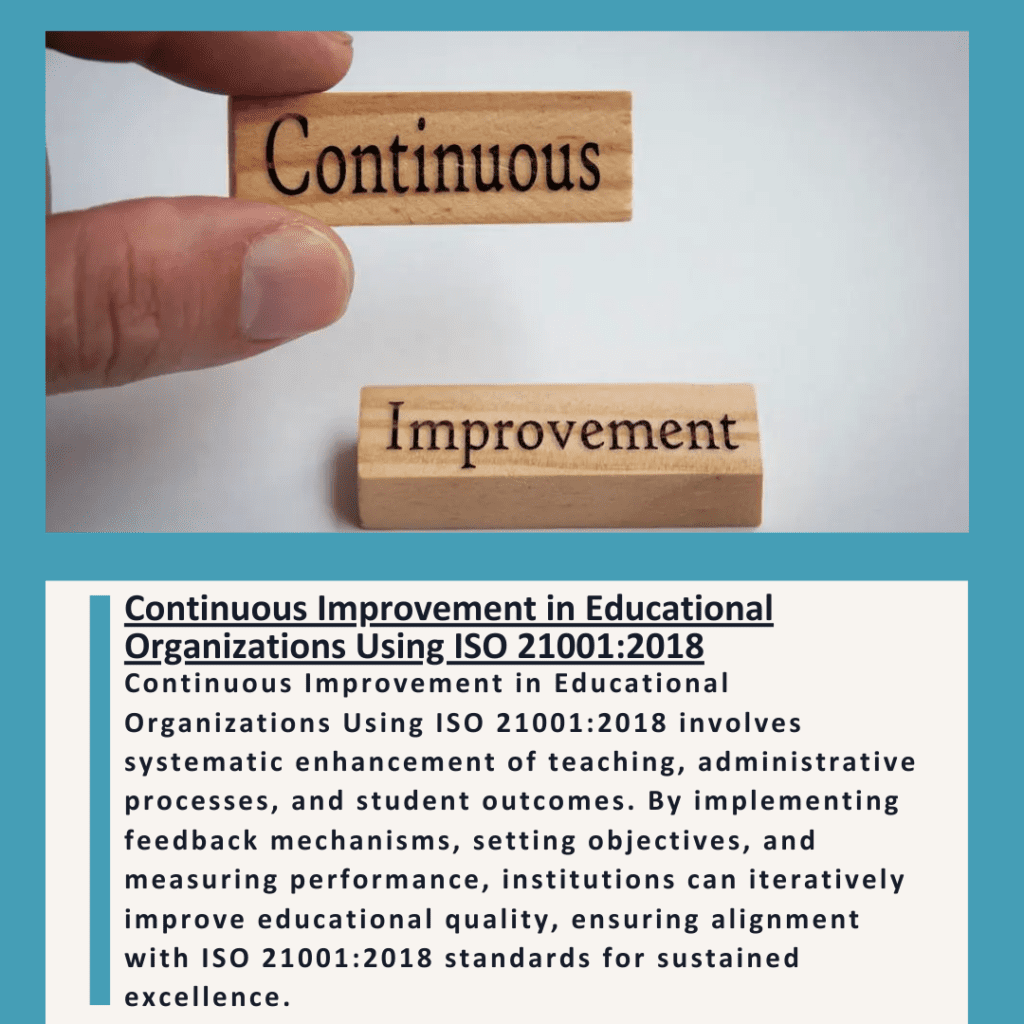Subtotal $0.00

ISO 21001:2018, the International Organization for Standardization’s standard for educational organizations, provides a structured framework that promotes continuous improvement in educational processes and outcomes. This standard, derived from the principles of ISO 9001:2015 adapted specifically for the education sector, emphasizes the importance of meeting student needs, enhancing satisfaction, and ensuring effective educational outcomes through systematic processes.
Understanding ISO 21001:2018
ISO 21001:2018 outlines requirements for an Educational Management System (EMS) that integrates the principles of quality management into the educational framework. The standard aims to assist educational institutions in improving their ability to consistently provide educational products and services that meet both statutory and regulatory requirements.
Key components of ISO 21001:2018 include:
Context of the Organization: Understanding the internal and external factors that impact educational processes and outcomes.
Leadership and Commitment: Demonstrating leadership commitment to quality management and ensuring the integration of EMS into the organization’s strategic direction.
Planning: Establishing objectives for enhancing educational processes and defining the actions needed to achieve them.
Support: Providing necessary resources, including personnel, infrastructure, and support services, to ensure effective implementation of educational activities.
Operation: Implementing planned educational activities, monitoring their effectiveness, and taking corrective actions when necessary.
Performance Evaluation: Monitoring, measuring, analyzing, and evaluating educational processes and outcomes to ensure they meet requirements.
Improvement: Continually improving the EMS through corrective actions, preventive actions, and innovations.
Promoting Continuous Improvement
ISO 21001:2018 promotes continuous improvement in educational organizations through several mechanisms:
1. Systematic Approach to Quality Management
The standard encourages educational institutions to adopt a systematic approach to managing their educational processes. By establishing clear objectives and systematically monitoring and evaluating performance against these objectives, institutions can identify areas for improvement. This approach ensures that improvements are not ad hoc but are integrated into the institution’s overall strategy.
2. Focus on Stakeholder Needs and Expectations
ISO 21001:2018 emphasizes the importance of understanding and meeting the needs and expectations of all stakeholders, including students, parents, faculty, staff, and regulatory bodies. By regularly engaging with stakeholders and soliciting their feedback, educational institutions can identify opportunities for improvement and tailor their educational services accordingly.
3. Data-Driven Decision Making
The standard encourages educational organizations to use data and evidence-based decision-making processes to drive improvement. By collecting and analyzing data related to educational processes and outcomes, institutions can identify trends, patterns, and areas of concern. This enables them to make informed decisions about where and how to implement improvements effectively.
4. Continuous Monitoring and Evaluation
ISO 21001:2018 requires educational institutions to establish processes for monitoring, measuring, analyzing, and evaluating their educational activities. This continuous monitoring and evaluation enable institutions to assess the effectiveness of their processes and identify areas that require improvement. Regular audits and reviews ensure that the EMS remains effective and responsive to changing educational needs and expectations.
5. Engagement of Leadership and Staff
The standard emphasizes the importance of leadership commitment and the involvement of all staff in promoting a culture of continuous improvement. By fostering a supportive environment where staff are encouraged to contribute ideas and participate in improvement initiatives, educational institutions can harness the collective expertise and creativity of their workforce to drive positive change.
6. Integration with Other Management Systems
ISO 21001:2018 encourages educational organizations to integrate EMS with other management systems, such as quality management systems (ISO 9001) or environmental management systems (ISO 14001). This integration ensures consistency in approach and facilitates alignment of objectives across different organizational functions, further enhancing the institution’s ability to achieve its educational goals.
Case Studies and Examples
Case Study 1: Implementation in a Higher Education Institution
A prominent university implemented ISO 21001:2018 to enhance the quality of its educational programs. Through a structured approach to quality management, the university identified opportunities to streamline administrative processes, improve student support services, and enhance teaching and learning experiences. Regular feedback from students and faculty enabled the institution to make data-driven improvements, resulting in increased student satisfaction and retention rates.
Case Study 2: Adoption in a K-12 School System
A school district adopted ISO 21001:2018 to standardize educational practices across its schools and improve overall performance. By establishing clear objectives for student achievement and implementing systematic monitoring and evaluation processes, the district identified areas where additional resources and support were needed. Collaborative efforts among teachers, administrators, and parents led to targeted interventions that significantly improved student outcomes and educational equity across the district.
Conclusion
ISO 21001:2018 provides educational organizations with a robust framework for promoting continuous improvement in educational processes and outcomes. By adopting a systematic approach to quality management, focusing on stakeholder needs, and integrating data-driven decision-making processes, institutions can enhance their ability to deliver high-quality educational services that meet the evolving needs of students and stakeholders. Through ongoing monitoring, evaluation, and engagement of leadership and staff, educational organizations can achieve sustained improvements in educational effectiveness, efficiency, and stakeholder satisfaction.